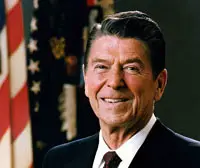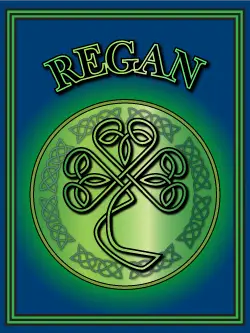Regan is a popular name throughout the world, both as a surname and a girl’s first name.
It is believed that the girl’s name Regan is not a variation of the Irish surname. Instead, it is derived from the English royal name Regina.
The surname has three separate origins in Ireland from as far back as the 6th and 7th centuries.
The word riagan meant ‘little king’ in Gaelic. It was the name given to one of the nephews of Brian Boru, High King of Ireland in the early parts of the 11th century. Riagan was granted territories around Counties Clare, Limerick and Tipperary.
The family name was changed to O’Riagan after several generations, as in Gaelic the ‘O’ prefix meant ‘the descendant of’, so the O’Riagan clan were descendants of Riagan.
There are also two more separate Irish origins of the name Regan.
The Four Tribes of Tara
The name Ó Riagáin emerged in the regions around Dublin and Meath in the 6th century. The name was a variation of the word riodhgach, which meant angry or impulsive.
The Ó Riagáins were one of the families that made up the Four Tribes of Tara, an alliance of powerful clans. The Four Tribes were one of the major defenders of Ireland against Viking invasions during the 8th and 9th centuries.
The Ó Riagáins were eventually displaced by the Normans in the late 1100s. They were forced west across Ireland and many settled around County Laois.
The third origin of the name Regan came from the area around County Cork. The Ó Riagáins were close associates of the powerful McCarthy family.
They too, were driven from their territory by the Normans. The last recorded chief of the Cork Ó Riagáins was Sir Teige Mac Shane O Regan, a soldier in the Jacobite army. O Regan was knighted for his loyalty to King James II.
He fought to help James regain the kingdoms of Britain and Ireland, after he had been overthrown by his daughter Queen Mary and her husband William of Orange.
The name became anglicised over time
The British finally took control of Ireland following their success in the Battle of the Boyne in 1690, and all three Regan families lost their power and influence.
The names became anglicised, as the British settled and integrated with the Irish. O’Regan, and O’Reagan became the common spelling and pronunciation of the names.
This later evolved to just Regan, Reagan and Ragan, as many Irish people dropped the Gaelic prefix ‘O’ from the front of the name. They did this because it was easier to find work in Ireland if you had an English sounding name.
By the time of the ‘Great Famine’ in the mid-1800s, many Regans had already left Ireland for a new life in America, Britain and Australia.
Thousands more emigrated in the years around the famine in order to survive, with life in Ireland a struggle against disease and starvation.
Famous Regans throughout history
There have been many people named Regan throughout history that have achieved success in their chosen fields.

The most famous is probably Ronald Reagan. He was a successful Hollywood actor before changing his career to go into politics.
He went on to become the President of the United States, ruling from 1981 to 1989. Reagan was the great-grandson of Irish emigrants from Tipperary.
Laura Regan is a Canadian actress who has had roles in several major television series including Mad Men, Nikita, CSI Miami, Charmed and Bones.
She has also starred in numerous films such as They, Dead Silence and How to be a Serial Killer.
Bill Regan was a star Major League Baseball player in the early 20th century. He has gone down in Red Sox folklore for being the first man to hit two home runs in the same innings, which he did in 1928.
Fionn Regan is an Irish singer-songwriter who has been nominated for several awards throughout his career.
He supported Lucinda Williams on her 2007 tour, and the country music legend described him as “this generation’s answer to Bob Dylan”.
